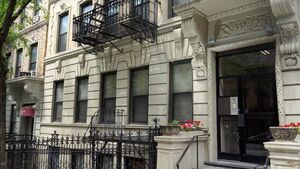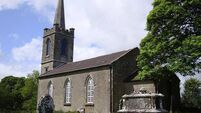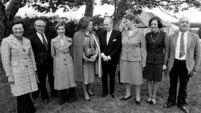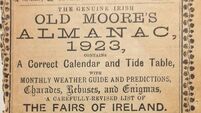A Sligo man who became famous in New York

The home at 140th Street in New York City where Joseph Gavan lived with his siblings.
Joseph W Gavaghan (known in US as Joseph W. Gavan) was born in the townland of Claddagh, near Aclare, in 1865. He was one of 11 children born on a small farm in the aftermath of the Great Famine and during a period of unrivalled political upheaval in Ireland.
I have written previously about Joseph’s brothers, Henry and Anthony, and common to them all is their humble origins and their meteoric rise to prominence in American life. Achieving such success, coming as they did from a poor Ox Mountain background, is truly remarkable.
Joseph followed his brother Anthony to New York, equipped with an education and a similar driving ambition. Alas, Anthony had built up such a rebel-rousing reputation with the authorities in America that it made Joseph change his surname. It would seem that if he felt if he was to stand any chance of success, he would have to distance himself from his older brother and so the new family name, Gavan, came into being.
Joseph, who was fluent in English and Irish, arrived in New York in June 1882, aged barely 18. He quickly followed the same route as Anthony in terms of career; he became a journalist with a Long Island newspaper. He later went on to become a lawyer but after some years, he returned to journalism.
As de facto head of the new Gavan family, Joseph later supported some of his remaining siblings to move to New York. He even returned home in 1897 to accompany his youngest sister, Annie, on her particular voyage to America. A census report from the time shows Joseph living together with siblings, Henry, Celia and Annie.
Joseph quickly became editor of a new newspaper, , in May 1892. At the time he described the paper as “the only democratic paper in Long Island City”. He goes on to say he proposes to conduct “a clean, family, democratic paper".
Joseph was a committed nationalist and never failed to express his desire for Irish freedom through his journalism. Almost instantly he created his own share of trouble and found himself the target of a gun attack. In June 1892, (Wilkes-Barre, Pennsylvania) reported on the attempted shooting of Joseph. The report was short and quite to the point.
By the late 1890s, Joseph was serving executive roles on some State Commission Boards. However, he soon moved on, taking his reporting skills with him to Philadelphia and Washington. While working as a special correspondent in Washington, he studied at Georgetown University and there received his law degree in 1904.
Returning to New York City, he was called to the bar but soon returned to journalism to become the managing editor of the . Joseph’s colourful vocabulary brought many demands for his services as a speaker, and he lectured for a time under the auspices of the New York Board of Education.
The Society of St Tammany was a New York City political organisation founded in 1786 and later incorporated as the Tammany Society. It was the main local political machine of the Democratic Party and played a major role in controlling New York City and New York State politics. From the 1790s, right up to the 1960s, the society also helped immigrants, most notably the Irish, to rise in American political circles.
Joseph was a committed Democrat and friend of the Tammany political machine. He was also a well-known political activist associated with several radical Irish-American organisations and was good friends with fellow attorney, James Mark Sullivan. Sullivan was later arrested for aiding in the 1916 Rebellion. Under his editorship, the New York served as an organ of Tammany Hall and catered to labour unions, Catholic Church news, and other topics of interest to Irish-Americans.
While Joseph never married, he nonetheless had a deep commitment to family. After arriving from Ireland, his sisters, Celia and Annie were installed in his New York apartment at 557 West 140th Street as housekeepers to himself and his brother Henry. On the face of it, this might seem a selfish enough act but the alternative - them marrying a poor farmer and having to rear large families back in the Ox Mountains, like their mother had done - was well and truly averted.
Joseph and Celia eventually moved out - Joseph to live in Washington and Celia to work in the home of a New York lawyer, Joseph S. Arbarbach. In these early days, Cecilia was a regular guest at receptions at the White House in the company of Joseph. Such events, hosted by President Roosevelt, were common and were put in place to honour the diplomatic corps as well as army and navy personnel. The attendance of the top newspaper people was a vital part of these events.
Joseph also wrote promotional pieces in many publications which frequently took the form of advertising blurbs, his use of language giving him a flair for such things. A rather bizarre set of articles, written in his early days as a journalist, extoled the virtues of wearing – off all things - a glass eye. The pieces, which appeared in newspapers all over America, were quite graphic and in today’s context of political correctness, a little inappropriate. The following extracts give a flavour.
(Chetopa, Kansas, September 1888).
(Knoxville, Tennessee, September 1888).
Back in New York, Joseph embarked on a period of prolific writing, completing articles on everything from Saint Patrick to Congressional law. At the age of 70 and clearly in failing health, Joseph W Gavan dies a heart attack on June 17th, 1935. He lies at rest beside his brothers, Anthony and Henry, in a cemetery in Queens, a long way from the stony fields of Claddagh where they played together as young boys.





